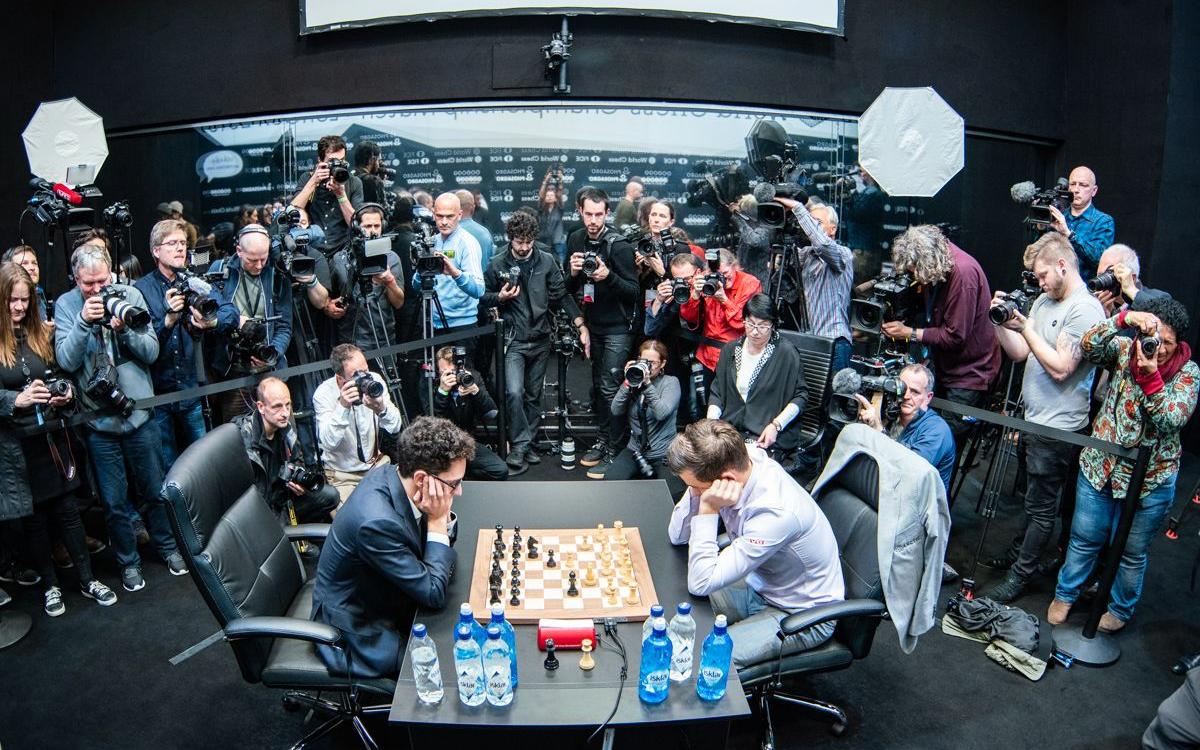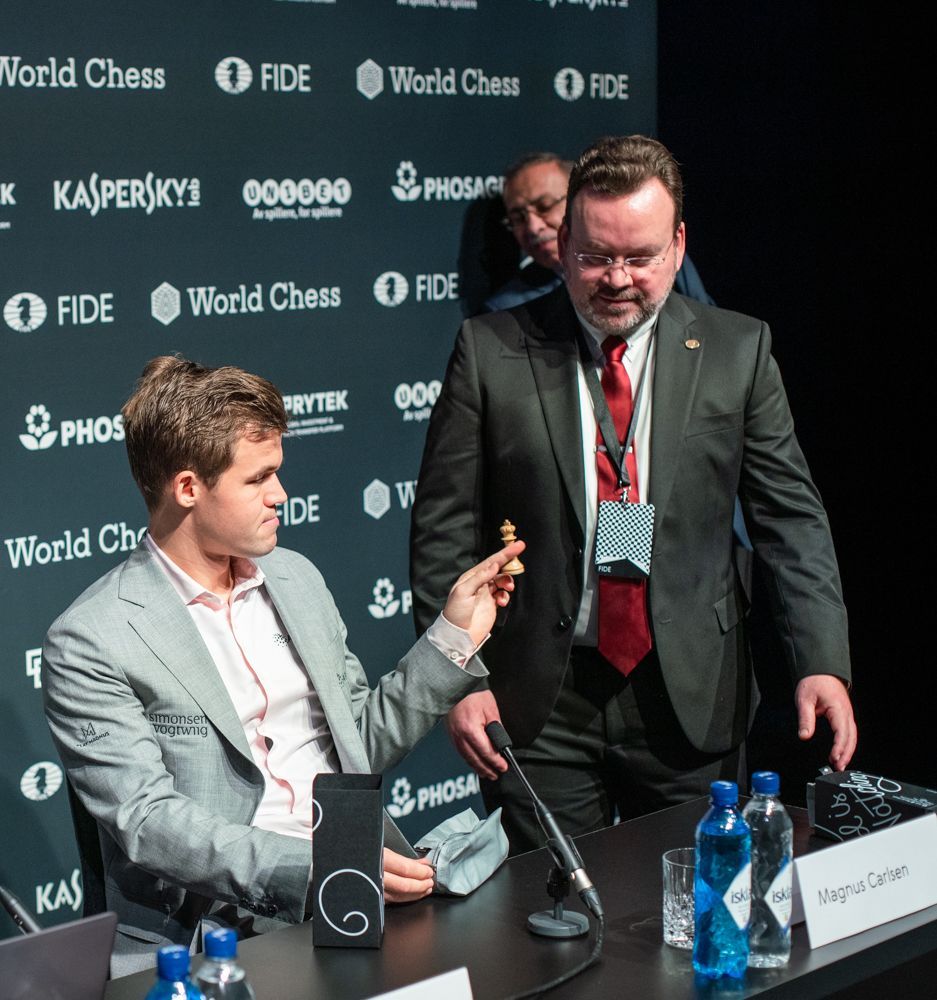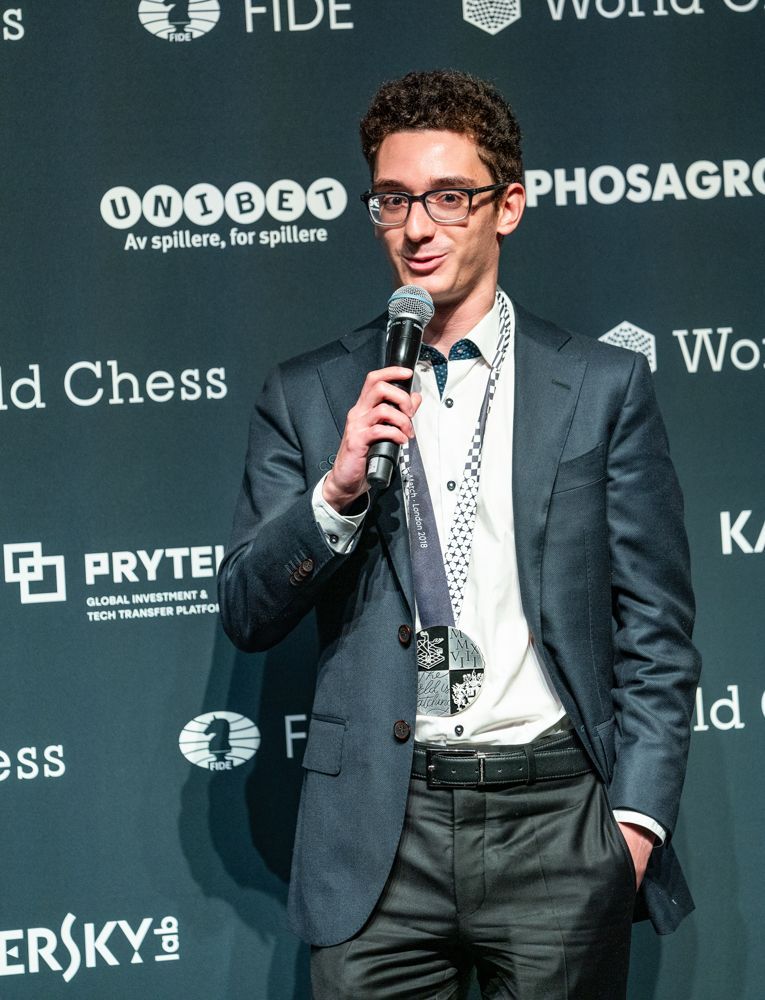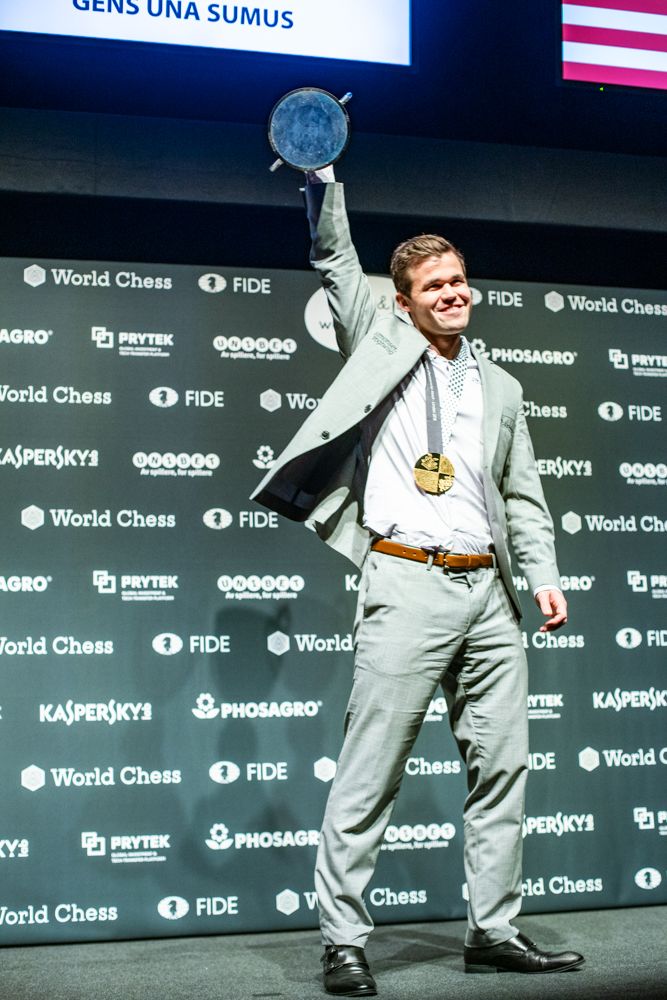
2018 World Chess Championship: The End
Magnus Carlsen bought himself another two years to work on his admittedly ailing classical game with a devastating, nearly cruel demolition of the undisputed challenger and co-king of slow chess, Fabiano Caruana, winning 3-0 in the rapid tiebreak. Both players were gracious afterwards, full of praise for each other, with only a little parting jab from Magnus to the eminent critics who excoriated him for his passive handling of an advantage in game 12, and his decision to seek victory by playoff.

Carlsen choosing the white queen to get the first move in the tiebreak. Photo: Maria Emelianova/Chess.com.
By now I am sure that readers will have had a feast of live commentary and on-the-scene daily reports, and this closer actually has more than half the match to cover. To provide something different, I will try to explore a few neglected angles and have a look at the match as a whole rather than examine each round. I apologize in advance for this being a very Carlsen-centric piece, but I hope that the reasons for this will be clear. He tells us more. And he is the champ.
I love a non-event
The hyped double white core of the match for the defending champion saw Magnus follow up his game six scare vs. the Petroff with another very hesitant performance against Caruana's other brick wall, the QGD. This continued the puzzling trend of Magnus using his Whites to fritter away nothing-to-nano advantages, and explaining this by invoking safety-first terminology. The impression given to—or taken by—observers was one of a champion suffering a growing crisis of confidence. Live on-site commentary host Anna Rudolf also noted that Magnus was regularly showing physical signs of insecure hesitation, doing the very unchampionly (it's a word now) thing of reaching out to make a move and then drawing his hand back to reconsider.

Anna Rudolf (@anna_rudolf ) on Chess.com.
After game seven, the second consecutive Carlsen White, the German journalist Stefan Löffler asked Carlsen if he was "ready to strike." (Löffler doubtless had game one still in mind, but was most definitely baffled by the champ's confession that in the critical moment of game seven, when there were some dynamic options in the early middlegame, he had opted for a safe continuation despite seeing that it gave him "nothing.") As Magnus hesitated, Stefan made the image of someone paralyzed by indecision in front of goal even stronger by saying Magnus could think of it as a football metaphor.
"That makes it even worse!" the champ replied, and the chuckles that this gathered made this appear to be an answer.
Stefan quizzed me about this afterwards, and it was actually the second evasion of the evening's conference, Magnus having earlier said he honestly had no idea how to answer a query about how to find his old self, the personal idol he had referenced after game five.
My favorite place to look for story angles is in these silent spaces. I told Stefan that I thought this was a highly eloquent evasion: Magnus is an extremely honest man and if he starts giving an answer to questions like these, he will say or reveal things he may regret, particularly in a title match where any glimpse into his psyche is worth gold.
The naked truth
Perhaps this doesn't really belong in the second half wrap-up, but I strongly believe Magnus delivered the pivotal message of the match disguised as a witticism in the press conference to gamer five, referenced above. "My favorite player from the past is probably myself from three or four years ago," Carlsen said. "Yeah, (age) 23."
The more I thought about it, and discussed it with other musers, the more convinced I became that it encapsulated everything about the champion's struggles in the past few years, and most certainly, here. With each passing game Magnus appeared to be more enthusiastic about the strength of his opponent, and made no secrets about his own hesitancy and reluctance to take risks. Having had his greatest chance in the very first game, and seeing his recent pattern of impatience and inaccuracy still in place, he had to confront this existential dilemma head-on, at the most important time. He isn't his old self.
Reverse strategy
One thing that makes the match particularly intriguing is Magnus' decision to take a stand as Black in the Sicilian, even into the tiebreaks. I would argue that this proves he came to London with high ambitions, and that the eventual conservatism that he chose was a response to his increasing acceptance and concern that he had no classical edge on Fabiano in London whatsoever.

Caruana addressing the audience at the world championship closing ceremony. | Photo: Maria Emelianova/Chess.com.
Black is not the new White....
There are a range of practical considerations that make playing Black an increasingly crucial aspect of a world title match.
Assuming well prepared teams, Black tends to have the advantage of first surprise, whereupon the opposing white team regroups and focuses at a more detailed level. This means that Black gets: Choice of turf: Beat my Petroff/Sicilian/QGD, etc. Black faces greater theoretical danger, and there is therefore a greater need to prioritize preparing as Black. Traditionally, there are greater chances of provoking risks when players have tended to view their white days as the time to act.
Team Caruana chose a traditional path, which could be anticipated from his general style and disposition, as well has his evolution towards being ultra-solid as Black, and this meant Fabiano Whites were almost guaranteed to be most action-packed.
I realize that this is a bit simplistic—and Vidit tweeted me that he viewed the Sveshnikov simply as '"the solid choice" Magnus decided on for the match—but I insist that there is more room for action, sharp yet balanced combat, in Sicilians than in many other sound alternatives. To put this in perspective, I ask the reader to envision a match where team Carlsen had also adopted the conventional approach of neutralize with Black and press hard with White, and chose something like...oh, maybe the Petroff?
That would likely be the 12-draw match of your darkest nightmares.
Nostalgia
There was a time when I thought Magnus for sure will reach 2900. #CarlsenCaruana
— Paco Vallejo (@Chessidharta) November 26, 2018
This was another extremely eloquent statement, and it echoed the feelings of nostalgia for the age of Maximum Carlsen that Magnus longs for. It reminded me of years of wondering when Magnus' striving to grow would pay off in a sudden synthesis of knowledge and a new stratospheric level, though I think that Paco was actually musing about how far the mighty had fallen.
External exercises
Expert commentary and punditry gravitates ever more to puzzling over the abstract issues in a title match, like the overall strategies opening choices might reveal, the internal struggle hidden behind a few unusual gestures, the look and sound of the players. Dissecting the games has been increasingly outsourced to machines.
Press rooms contain a lot of battle-hardened veterans, and younger reporters who still have the energy to be ceaseless scoop-seekers. People will be looking for stories, looking to create stories, looking to find enlightenment from staring at impassive faces. They'll find plenty of angles, and they are good at what they do.
I'm sitting next to my old boss, Jonathan Speelman, who divides his time in the press room between firing off all sorts of chess ideas, trying to ignore the engines, and contemplating various psychological interpretations of what moods motivate which over-the-board decisions, when he suddenly looks around the room and says, "Almost no one else here really gets it—they haven't been in matches."
I'm not telling you this to gain credibility (OK, maybe I am), but he is referring to my seconding him through various candidates' matches in the lost mists of time, and his experience as both a match player and second (for Vishy, in olden days). We've done this constant planning, plotting and second-guessing from the inside before, and this jogs a memory that gives me a nearly forgotten perspective.
The view from within
And that memory is this: Those times I was in the trenches as a second, I was astonished by how everything written—by people I knew so well and deeply respected, and whom I had so many interesting discussions with, before and after—now looked like complete idiocy. They understood approximately nothing about what was going on, match strategy, choice of opening timing, nothing about anything. Because there is always a lot of thought inside a camp, behind every tiny factor, starting long before the event, and the odds of an outsider puzzling them all out is close to zero. And that internal reckoning is the only one that really matters.
Short memories, shorter tempers
When it took a few days to come to grips with the complications of a title game, due to only having human brain power to apply on analysis of the moves of far stronger players, people understood how hard the games were and calmed down a bit. A lot. Fast. In the old days, you couldn't scream into the ether immediately, either. The players are far more harshly judged now, and not just by hysterics with engines.
In light of this shocking draw offer from Magnus in a superior position with more time, I reconsider my evaluation of him being the favorite in rapids. Tiebreaks require tremendous nerves and he seems to be losing his.
— Garry Kasparov (@Kasparov63) November 26, 2018
The conclusion of game 12 set off an instant firestorm of criticism about Carlsen's nerves and guts, when it perhaps should have set off reminiscing about comparable moments in the past.
Kramnik: "I think the chances of winning the final position were much higher than winning the tie-break itself"
— chess24.com (@chess24com) November 27, 2018
"Magnus is a fighter by nature, and I doubt his feeling comfortable in the months to come. I think he committed a grave human error..." https://t.co/WLoXdtcN0y
I was startled as well, but my two cents is that the final position wasn't the shocker. Why Carlsen had methodically avoided increasing his obvious advantage was where to direct criticism. But as he said bluntly in the post-game press conference about engine assessments of his edge, he just didn't care. He'd gotten what he wanted. And aimed for.
Regulation time
I think that once again, Magnus may have tricked the world into thinking he is shaken and frightened, when he is being cold and calculating. (But he must be a bit shaken to be in tiebreaks again...) I admit my reflex was to doubt the champ's nerves, but I was fooled last time. I thought again about how the only thing that matters is the strategy inside a camp. And how stupid people like me look from in there.
In sports it is a safe assumption that the latest generation is the greatest, fastest, strongest—that's just how things work. No matter what happens, I think we must assume that Magnus has always had a match plan, and it adjusted according to developments. He faced up to and coped with the growing understanding that 23-year-old Maximum Carlsen had once again failed to turn up, and that worried, slightly sloppy 2018 Magnus had to win this match. Their final strategy was the only one that counted. I now saw the final two games of the match in this light as a purely sporting exercise, where success was the only goal, and chess more of a medium towards it than the actual substance of the event.
There are only two things that matter in a match, in the end only one: the team strategies; and the one that wins.
Pundits were assuming that the Magnus in London, with his open admissions of caution and respect, was somehow a less ambitious or dangerous man. People were reasoning that his rapid edge was overrated, and he'd regret game 12. This is the deadliest error possible. Carlsen lives to win, and to find a way to do so. If he gets hold of a finger, he will take every limb. He had told everyone what he wanted.
In Magnus we trust
Peter Heine Nielsen dispensed plenty of pre-playoff wisdom, as an experienced title match second can. He put Kasparov's G12 disappointment into context (saying Garry had forgotten how stressful title matches are) and Vidit Gujrathi's video clip find added some wonderful depth, including Kasparov's explanation that he had been "programmed" to draw on that day.
Will history repeat itself today? #CarlsenCaruana pic.twitter.com/2bYRdvwswN
— Vidit Gujrathi (@viditchess) November 28, 2018
Tiebreaks
I was going to joke that Magnus seems to let loose as soon as he doesn't have to keep score of the game, but it is more likely that in rapid chess he has no time to generate doubts, and his intuition is more fully switched on. The sense of confidence and comfort that had been lacking since the very early days of the match was visible again, though it was still fragile in the nervy duel of game one as clocks ticked down towards zero. Game two was devastating, and a clear sign that adjusting to the sudden shift of style and tempo in the playoff was Caruana's biggest challenge of the match, and perhaps the hardest situation to plan for.
Svidler: "Today felt like slaughter" #CarlsenCaruana
— chess24.com (@chess24com) November 28, 2018
To me, even if Magnus had played feebly in the playoff his game 12 strategy would have been justified, as it seemed to be tailored to a painful and unflinching assessment that he was not in top form, and to maximize his chances based on that conclusion. As he would repeat several times after the event, he takes his decisions based on what he thinks is best for him at the time, and that such tough decisions simply have to be made. What happens after is not really directly connected.
I know that people judge by the ultimate outcome of a decision. However, this is completely the wrong way to approach any issue. If someone offers you $300 return on a $100 coinflip and you lose, did you make the incorrect decision when you accepted the proposition?
— Baard Dahl (@bvdahl) November 28, 2018
Magnus might eventually regret what transpires, but he can never do anything but make those tough calls. He has never hesitated to make them, and to make them alone: "I've been a chess professional now for many years and my chess career dates even further back than that and one of the things that I've never done very well is listen to other people's advice. I’ve always gone my own way...and it's brought me this trophy today!"

Carlsen raising his trophy. | Photo: Maria Emelianova/Chess.com.
Legacy
Of course the social mediasphere is buzzing with one of the classic post-match topics: how to change either the rules of the contest, or the game, in order to guarantee things are more exciting in the future. But as chess evolves, it is far more likely to get more drawish as levels rise and engines influence preparation. The response in classical chess so far has been to make the games faster and faster, to introduce a higher error/human factor. Players have adapted. Ever faster is the most likely route. Amateurs with engines will mock, and players will be driven to err more.
I don't think any drastic changes are needed—yet. If Magnus had just converted the very, and most, winnable advantage from game one, what a different match we would surely have seen. But it won't take much more of deadlock to provoke new experiments.
Magnus' real prize is another two years to try and find his inner Max. While his pragmatic sporting decisions in London preserved his title, only his fiercest supporters can believe he has done his legacy much good. He admits the loss of his edge, the sacrifice of his former fearless fighting spirit will doubtless cost him some fans, and it is also surely an ingredient in his loss of classical dominance. Sporting success is paramount for Magnus, but his sheer focus on this raises many questions, and Kramnik's detailed thoughts are well worth reading.
Fabiano leaves London bitterly disappointed, but with an astonishing inner objectivity and equilibrium that was generally terrifying to behold. It might not sound scary, but there is something deeply unsettling about an adversary who never seems shaken or tired, who never loses his cool or his warmth. He has doubtless gained admirers and inspired followers, despite the narrowest of possible defeats. He has gained invaluable experience. It would be an unthinkable tragedy if he is not on this stage again.






